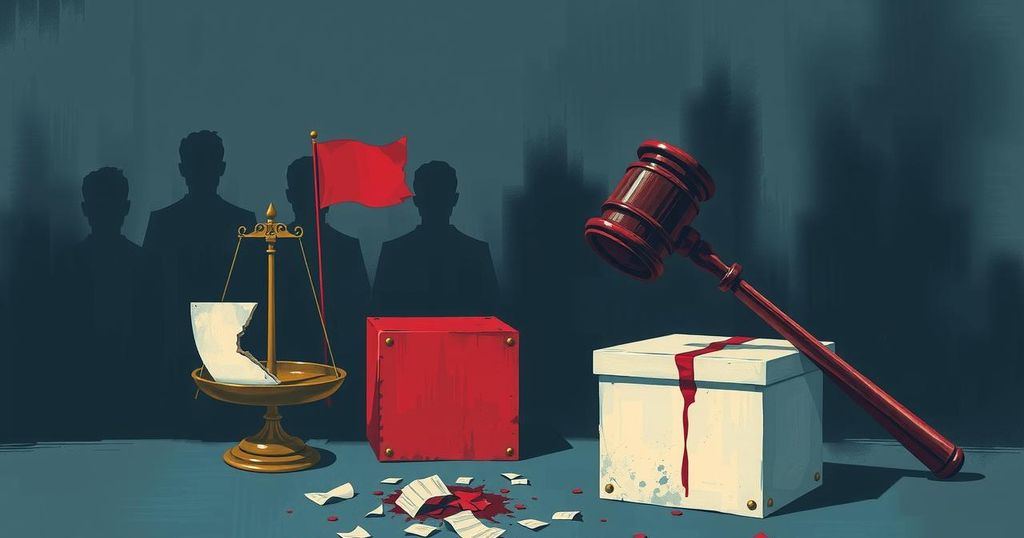Concerns Emerge Over the Decline of Democracy in Nigeria

Prominent Nigerians, including past governors and public officials, convened to address concerns regarding the decline of democracy in Nigeria at a recent colloquium. Bishop Matthew Kukah critiqued the current system’s ability to serve the populace, while Peter Obi and others highlighted democratic regression and the need for constitutional reform. Some participants, however, suggested that democracy is evolving positively despite prevailing challenges.
Eminent Nigerians, including former governors and public office holders, expressed grave concerns regarding the decline of democracy in Nigeria at a colloquium held to celebrate Emeka Ihedioha’s 60th birthday. The event, chaired by former President Olusegun Obasanjo, featured significant figures such as former Vice-President Atiku Abubakar and former Commonwealth Secretary-General Emeka Anyaoku. Participants highlighted the dire need for a reevaluation of democratic practices in the country.
In his address, Bishop Matthew Kukah criticized the current state of democracy, suggesting it primarily serves a select few. He emphasized that Africa cannot solely adopt Western models of democracy, proposing the necessity of a system reflective of African values and culture. Kukah urged immediate reforms, asserting that the rigorous pressures placed on the judiciary are indicative of a broader crisis within Nigerian democracy.
Kukah pointedly remarked on the relationship between Obasanjo and Atiku, comparing it to a marriage: “You will quarrel without breaking up.” He referenced the detrimental impact of weaponized religion on democracy, stressing that for democracy to thrive, it must be sustained by equitable treatment across all communities.
Contrary to Kukah’s assertion, Peter Obi argued that Nigeria’s democracy is regressing rather than evolving. He recounted his own experience as a governor, emphasizing the decline in the judicial process and political integrity. Obi recalled how, during his impeachment, influential leaders implored for his retention, a stark contrast to today’s political climate, which he denounced as irreparably damaged.
Former President Obasanjo reflected on the current democratic system in Africa, arguing that it fails to encapsulate the essence of governance by the people. He criticized the existing constitutional framework as disconnected from the realities of African life, suggesting, “What do we have today?” His call for a more culturally relevant democracy echoes the need for structural reform in Nigeria.
Atiku Abubakar reiterated the sacrifices made by leaders to secure democratic governance, highlighting the need for loyalty and dedication among politicians, regardless of their varying ideologies. Meanwhile, Aminu Tambuwal called for collective responsibility in enhancing Nigeria’s democracy, expressing disdain for recent emergency declarations made without proper legislative procedure.
Former Commonwealth Secretary-General Emeka Anyaoku urged for a review of the 1999 Constitution to address ongoing challenges, describing true federalism as a mechanism for managing Nigeria’s diversity and ensuring sustainable governance. He stressed that Nigeria must distill a distinctive democratic narrative, moving away from Eurocentric models.
Conversely, Speaker of the House of Representatives Tajudeen Abbas defended the notion that democracy is progressing in Nigeria, citing the evolution of governance structures and the importance of elections in fostering political participation. He acknowledged the complexities faced by Nigeria but insisted that the foundations of democracy are being solidified.
The discussions among prominent Nigerians reveal a consensus on the challenges besieging Nigeria’s democracy, with calls for sustainable reforms and a reevaluation of the electoral and constitutional frameworks. While some express a dire view of democratic regression, others advocate for gradual improvement, emphasizing the need for collective responsibility and loyalty among political leaders. With urgent acknowledgment of the existing crisis and proposals for reform, there lies a potential pathway to rejuvenate Nigeria’s democratic practices.
Original Source: punchng.com







